
Pacey, Arnold, The Meaning in Technology 
Exploration, Invention and
the Remaking of Nature![]()
![]()
Invitations from Nature | Explorations & Journeys | Remaking the Landscape | Engineering & Gardening | The Middle Landscape | Modern Environments | Summary
|
|
|
|
"Nature was a world of spiritual activity... and the living spirits...." p. 139. |
Le Mont St. Michel, Normandy, France (708, 1017, 1228, 1450) |
Invitations from Nature
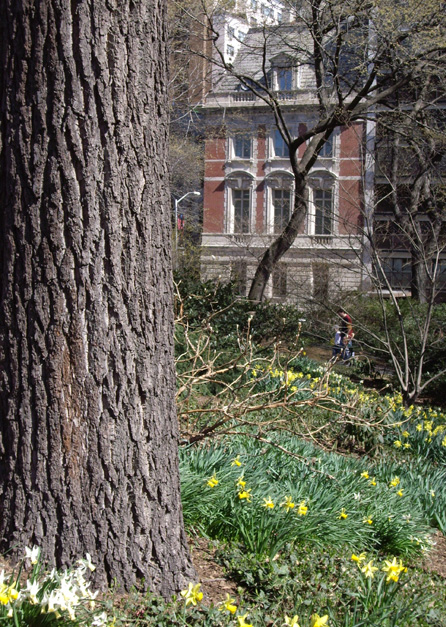
"strong feelings emerge about the land as a source of meaning, and of even virtue."
Nature a "courting" or inviting" human action since we are "drawn to specific places."
" Some places ...can invite one to leave their mark...."
The view of a mansion from east side of Central Park, in Manhattan reveals the presence of the untamed in the midst of the urban grid lines of streets and utilities that thrive to keep the city alive ad are essential to thriving metropolitan areas.
Nature though in the form a of a park with rural facets and even wild features may serve as a retreat, as welcome contrast that provide still the context of urban life and even some meaning in terms of revealing what might be called the underlying landscape of what the area may once have been like, despite the artificial qualities of parks as places of recreation and pleasure in the out of doors.
Twin impulses:
- be at home
- explore the margins
p. 123
"Participatory experience as opposed to a detached , analytical style...."
ethology as the biological, (sometimes anthropological) and psychological study of behavior
Invitations from Nature | Explorations & Journeys | Remaking the Landscape | Engineering & Gardening | The Middle Landscape | Modern Environments | Summary
![]()
The Exploratory drive in animate life
It is an urge as basic as hunger, and as easily observed.
"exploration is part of the play behavior of animals and humans."
"We have already noted that primeval humans did not easily live in 'harmony with nature,' nor do children."
"the impulse to protect and cherish small animals, flowers, gardens --perhaps whole ecosystems-- is in tension with a destructive curiosity about nature."
"One expression of that tension is that some hunter-gatherers had rituals for asking forgiveness of the animals they killed."
"...conflicting impulses. . . . the way we resolve tensions among them may change."
p. 124.
"Even William Wordsworth..." and other writers reveal that
"for a significant minority, destructive impulses not only persist and influence attitudes to nature, but...to people also."
Invitations from Nature | Explorations & Journeys | Remaking the Landscape | Engineering & Gardening | The Middle Landscape | Modern Environments | Summary
![]()
"Interest in other animals"
"the horse...its speed when running seems to have been the quality that people most envied...."
About 2000 B.C. in the Middle East, a pair of horses harnessed to a chariot could enable " people "to travel at speeds never before experienced."
"And so the sun god, traversing the heavens each day from horizon to horizon, was imagined to be drawn by horses.
And here, as in so many branches of technology, invention that appealed to the imagination (or was useful (decisive) in warfare preceded practical, utilitarian developments. Harness that enabled the horse to be used for heavy haulage, or to be saddled for easy riding, developed much later than the chariot."
"The flight of birds had immense imaginative appeal in most cultures,...."
p. 125.
"In China kites large enough to lift people were made centuries ago and in the West, practical balloons were invented before 1800."
Arthur Koestler, writer and social critic, describes the myths we have about power over nature in these stories:
Icarus and Daedalus, Prometheus, Faust all legends of seeking "god-like power."
"He noted that these stories all describe human efforts to acquire power over nature, and they all offer warning about the dangers of such an enterprise.
Although the search for Promethean power may become an obsession for some people, obtaining more limited powers of motion and flight can be liberating in an innocent, enjoyable way."
p. 126.
"Like literacy, printing, firearms, bicycles and automobiles, computers are self-revealing inventions. It is what we learn from them about ourselves--our impulses, purposes abilities, and potential--that makes these technologies seem revolutionary."
p. 127.
Compare to Postman: An Improbable World in Technopoly.
Invitations from Nature | Explorations & Journeys | Remaking the Landscape | Engineering & Gardening | The Middle Landscape | Modern Environments | Summary
![]()
Explorations and Journeys | p. 127.
"one of the strongest impulses is that which makes us wish to explore the world...."
"something fundamental is missing--a lack of interest in and understanding of other human beings."
p. 129.
"Jean Batten, a pilot...' the greatest navigator and all-around aviator of her day.'
but "her life was a 'lonely tragedy.'
"There may be a connection here with the findings of psychologists... that some individuals drawn to work in engineering appear to be slightly autistic, and prefer research with an object-centered focus.
p. 130.
Invitations from Nature | Explorations & Journeys | Remaking the Landscape | Engineering & Gardening | The Middle Landscape | Modern Environments | Summary
![]()
Remaking the Landscape | p. 130.
"wild landscapes being tamed and used for agriculture."
Phoenix, Arizona is a desert city impossible without aqueducts, cars, and electricity as co-facilitators of life.
"whole tracts of countryside can disappear under the concrete of freeways and fly overs, dams or urban sprawl."
"Jacques Ellul put the matter in a different perspective by remarking that the current aim of civilization was to replace the 'natural milieu' of people's lives with a 'technical milieu' in which 'everything that goes...to make a livelihood, habitat and habit is modified."
p. 130-31.
"... land use is now so intensive that in many places, it has begun to extinguish the human meanings associated with place....and the conditions of their lives are depressing to the human spirit."
|
Rural or agrarian landscape of southern
Britain. |
urban and suburban sprawl of the western
United States |
Invitations from Nature | Explorations & Journeys | Remaking the Landscape | Engineering & Gardening | The Middle Landscape | Modern Environments | Summary
![]()
"yet the economic and ecological degradation of the environment has a counterpart in human experience of alienation and loss that needs to be recognized.
"...the remaking of the world as a technical milieu"
--and now the remaking of the genetic basis of life--
raises urgent questions on every level: existential, social and economic, as well as ecological."
For further analysis, see "three worlds"
p. 131.
Invitations from Nature | Explorations & Journeys | Remaking the Landscape | Engineering & Gardening | The Middle Landscape | Modern Environments | Summary
![]()
Engineering and Gardening | p. 133.
 Thomas Jefferson designed the University of Virginia, the quadrangle is depicted here, revealing the gardenesque quality of this campus. Jefferson was also the architect of the national survey system in the draft of the Land Ordinance of 1785.
Thomas Jefferson designed the University of Virginia, the quadrangle is depicted here, revealing the gardenesque quality of this campus. Jefferson was also the architect of the national survey system in the draft of the Land Ordinance of 1785.
"people have tried to define where the balance between nature and technology should lie, there is a range of ideas to consider,
Chinese versus European approaches:
Lewis "Mumford stressed the importance of the garden during an early phase of human innovation, when plants were being domesticated and pottery was first made."
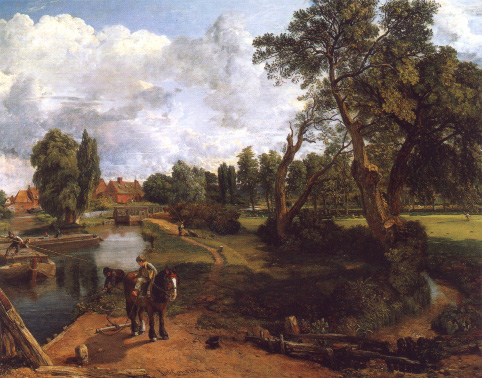
Medieval Islamic culture showed a similar mechanical emphasis. Gardens were places to escape from the scorching deserts...' watered by crystal brooks,' or 'shaded by palm trees and refreshed by a gentle flowing stream...."
p. 136.
In medieval Baghdad, the machine and the garden worked in partnership, and both were subjects of intellectual interest. A book written in AD 1206 mentions pumps with metal cylinders associated with designs for garden fountains."
p. 137.
p. 131.
![]()
The Middle Landscape | p. 138.
"Daoist engineers in China and Gardeners in many cultures expressed a view about how technology should be used that had parallels with the ideal of the 'middle landscape' discussed in the United States from about 1780.
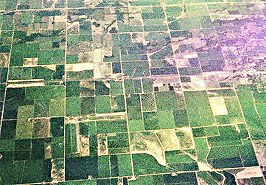 This, then, was the middle landscape --the grid pattern on the landscape symbolizing the farmland's virtue, as expressed in a simple repetitive pattern-- in which nature
was modified, but not obliterated, by the creation of meadows and orchards.
And it presented an ideal with which Jefferson greatly sympathized, even while
he recognized that the industrial revolution was taking root in America.
This, then, was the middle landscape --the grid pattern on the landscape symbolizing the farmland's virtue, as expressed in a simple repetitive pattern-- in which nature
was modified, but not obliterated, by the creation of meadows and orchards.
And it presented an ideal with which Jefferson greatly sympathized, even while
he recognized that the industrial revolution was taking root in America.
But a pastoral ideal remained strongly alive in America....The middle landscape was the garden ideal in another guise."
p. 138.
![]()
Modern Environments | p. 142.
This dam on the Snake River is in the Teton National Park is used largely for the irrigation of sugar beets, However, it was justified, in part, as a flood control measure, in addition to meeting needs for water in the northwestern deserts.
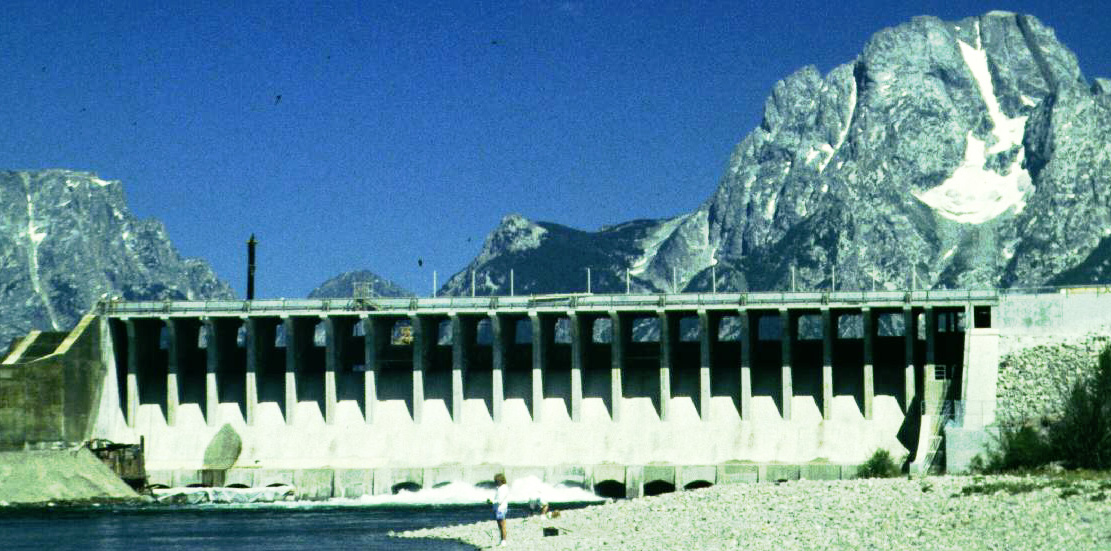 Behind the dam on the upper reaches of the Snake RIver is a view of the Grand Teton mountain range. That mountain range was once the property of the Rockefeller family whose ethos of conservation conjoined with financial opportunities when they generously gave the land to the United States Park Service to preserve the integrity of the forests and streams at the base of these magnificent-looking (aesthetically appealing) fault-block mountains. Although the park is a preserve, the national priority of irrigation and flood control justified the intrusion of this large scale technology in to the garden like qualities of this wilder of the national parks.
Behind the dam on the upper reaches of the Snake RIver is a view of the Grand Teton mountain range. That mountain range was once the property of the Rockefeller family whose ethos of conservation conjoined with financial opportunities when they generously gave the land to the United States Park Service to preserve the integrity of the forests and streams at the base of these magnificent-looking (aesthetically appealing) fault-block mountains. Although the park is a preserve, the national priority of irrigation and flood control justified the intrusion of this large scale technology in to the garden like qualities of this wilder of the national parks.
Dams bring the industrial needs of the urban manufacturing sectors deep into rural areas and even wilder land-use patterns associated with the remote countryside.
"Thoreau climbed Mount Katahdin,[Maine]....here was no man's garden....It was the fresh and natural surface of the planet Earth, as it was made forever and ever"
"That defines wilderness relative to middle landscape, as does Thoreau's comment that the vast forests of Maine were 'inhuman,' however beautiful..."
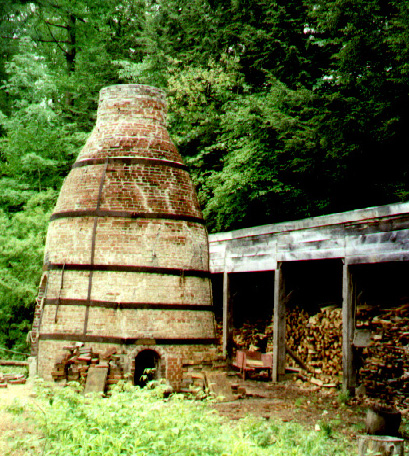 "for many people in modern consumer societies,
even middle landscape is too stark, or weather too variable, the necessity occasionally
to walk too tiring."
"for many people in modern consumer societies,
even middle landscape is too stark, or weather too variable, the necessity occasionally
to walk too tiring."
"relaxing indoors with their electronic entertainments."
"To take that attitude, though, is to say that land and nature no longer have meaning except as means to produce food and raw materials."
Pacey, p. 142.
A limekiln for making bricks was located in the Appalachian mountains high up in the Cumberland gap between Virginia and Kentucky because the readily available limestone, and forest trees for charcoal were in ample supply –thus industrialization in England and America, as well as in developing countries today, can and does take place in rural areas, despite the agrarian myth to the contrary.
"However, many aspects of the environment, including the atmosphere, soil structures, and biodiversity, are outside the scope of economics. So 'a free market approach to the global pollution crisis seems inherently impossible. No one owns the air or water."
Pacey, p. 142-143.
"Modifications to industrial processes informed by the so called natural-step approach may take more account of these issues, but rarely the whole range."
For example a partial (not whole, or full-range) approach considers serious matters dealing:
- with pollution but not the loss of biodiversity,
- with energy but not entropy
- with hydroelectricity but not considering the salmon on dammed rivers, or
- with under-appreciated and thus undervalued (discounted) lands.
invitations from Nature | Explorations & Journeys | Remaking the Landscape | Engineering & Gardening | The Middle Landscape | Modern Environments
"For some communities, alienation from nature, which may be a more serious part of the problem for all of us than we usually allow. For some communities alienation from nature leads to abuse of the environment."
Consider the myth of Anteaus. "sense of the sacred"
Mountainside denuded of forest cover by logging in Oregon
"Such changes (superficial changes in consumption patterns) ... depend on recovery of the reverential.
"they shared those landscapes with the spirits"
Pacey, p. 143.
The ecological approach:
"deep ecology" idea that superficial market approaches, boycotts, and lifestyle changes will not avoid disaster.
belief in "reverential conservation " because nature "embodies 'a spiritual principle'."
"an affirmative way"
"enjoying the wonderful vitality and musicality of nature, through visual and tactile experience"
"Indeed the garden, properly understood, could be a ...model--for all our dealings with nature, especially if we regard national parks, wildlife reserves, and any field where nature is cherished as a garden."
Pacey, p. 144.
"With regard to diversity especially, even small suburban gardens can be surprisingly effective as refuges for wild animals and birds."
invitations from Nature | Explorations & Journeys | Remaking the Landscape | Engineering & Gardening | The Middle Landscape | Modern Environments
![]()
Gardens as symbolic reflections of agrarian visions about a productive land.
"see the garden as a place where the defined purposes of the human gardener, conservationist or farmer encounter the undefined purposiveness of nature."
A garden from the window in the Alhambra in Spain
invitations from Nature | Explorations & Journeys | Remaking the Landscape | Engineering & Gardening | The Middle Landscape | Modern Environments
![]()
"We have a choice:
| imposing our own purposes | understanding and working along with |
|
competitive, no compromise, contest with entropy, ecology and evolutionary genetics |
symbiotic, coevolution, cooperation with nature's own purposiveness |
Pacey, p. 145.
"A garden can be a paradigm for environmentally appropriate technology to set against the currently dominant dominant paradigm that aims to remake nature and compel us to live entirely in a technical milieu."
Pacey, p. 146.
invitations
from Nature | Explorations
& Journeys | Remaking the Landscape | Engineering
& Gardening | The Middle Landscape | Modern Environments![]()
Alienation, means to become estranged from something, removed or distanced from some essential ingredient of life. Also to take for ones own and keep from others, hence to distance that object from anyone else.
Purposiveness, giving purpose to something, the capacity to contribute meaning to an object, person, process or creation that imbues that thing with a special quality. Having the ability to cause people to act in a certain desired or undesired manner based on something others believe true, plausible or, probable about a person place or thing.
![]()
![]()
Invitations from Nature | Explorations & Journeys | Remaking the Landscape | Engineering & Gardening | The Middle Landscape | Modern Environments
| Meaning in Technology, 2001 | 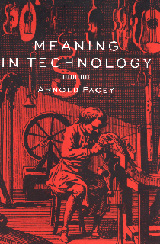
|
|
Pacey on hand-craft | an overview | course home page

|

|
|